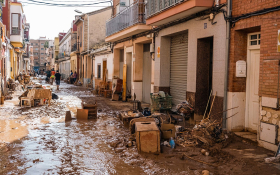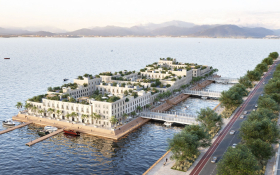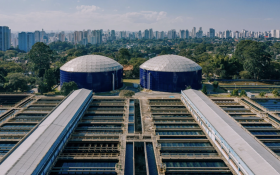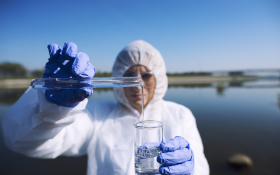SIWW2014:'Involving politicians and raising public awareness are main tasks for today's water utilities'
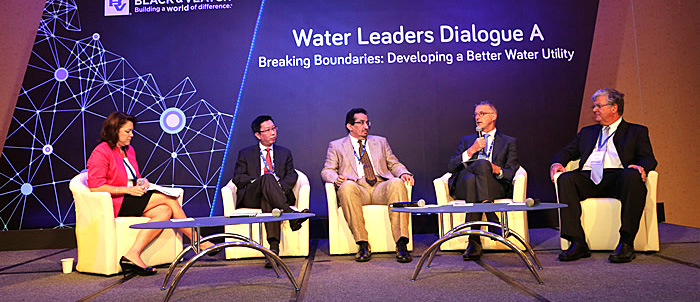
"It is a main task for ceo's of water utilities to involve politicians and raise more public awareness on the importance of reliable and clean water supply", said Chief executive office Martien den Blanken of the Dutch water supply company PWN Noord-Holland at the Singapore International Water Week 2014 on 3 June.
He was one of the panelists at the Water Leaders Dialogue Breaking Boundaries: Developing a better water utility. Two
central themes were awareness and cost recovery. In many cities the water infrastructure is aging and huge investments are
needed to renew treatment plants and distribution systems for tap water.
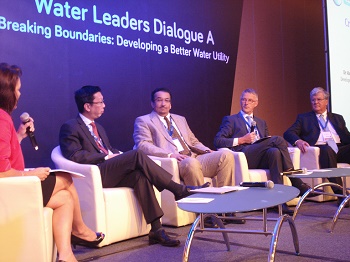 According to Den Blanken (second right on photo) politicians and consumers must be told that the delivery of excellent tap water has a price we need to paid. "In the end the price for water that is delivered at the tap is much cheaper for the consumer than bottled
According to Den Blanken (second right on photo) politicians and consumers must be told that the delivery of excellent tap water has a price we need to paid. "In the end the price for water that is delivered at the tap is much cheaper for the consumer than bottled
water. For continuation of this delivery it is important to have clean rivers and aquifers".
Den Blanken considered stakeholder engagement essential for water utilities to be able to innovate and respond to climate
change.
Get connected with social media
In one of the panel sessions CEO Sue Murphy of the Water Corporation of Western Australia pointed out the importance of
social media to keep in contact with the younger generation. "They have an enormous faith in technology. Do not try to
convince them of the need for new technologies", she advised. "Just communicate what you are doing and use every channel
on social media that is available."
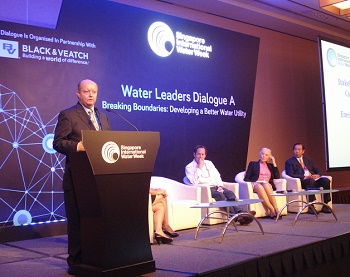 Full cost recovery
Full cost recovery
Governments are looking for new ways to finance the costly expansion or renewal of urban infrastructures. To be able to
involve the private sector the principle of full cost recovery is essential. In the end private investors want their
money back. The panel discussions made clear that a global debate on this issue is difficult as regional situations differ.
Higher tariffs in poor countries
Secretary of State HE Ek Sonn Chan of Cambodia told the audience at the Water Leaders Dialogue that in his country the
increase of water tariffs is blocked by politicians. "They want to be re-elected and raising the price of water will not
make them popular. It needs a change of culture as people believe that the access to clean drinking water is for free."
Ek Sonn Chan: "They have to be told that the treatment and distribution costs money and we must be allowed to increase our tariffs to be able to reduce leakage and increase the number of connections."
Higher tariffs in rich countries
The situation in the water scarce region of the Middle East is different. Here governments are used to pay for the
realisation of water infrastructure and water tariffs are low. There is no real need to raise the tariffs told Deputy governor Abdullah Al Alshaikh of the Saline Water Conversion Corporation (SWCC) in Saudi Arabia.
The panel discussion made clear that the issue of raising the water tariffs in his country has more to do with water saving. Higher tariffs make consumers more aware of their water use and motivates to reduce their water use.
Also read on this website
• SIWW2014: PUB Singapore joins Watershare knowledge platform as Gold Member, 3 June 2014
• SIWW2014: Dutch minister Schultz calls for action on mitigation water-related disasters, 2 June 2014
• Meet the Dutch water sector at Singapore International Water Week
More information
Water leaders dialogues
Singapore International Water Week
www.siww.com.sg
